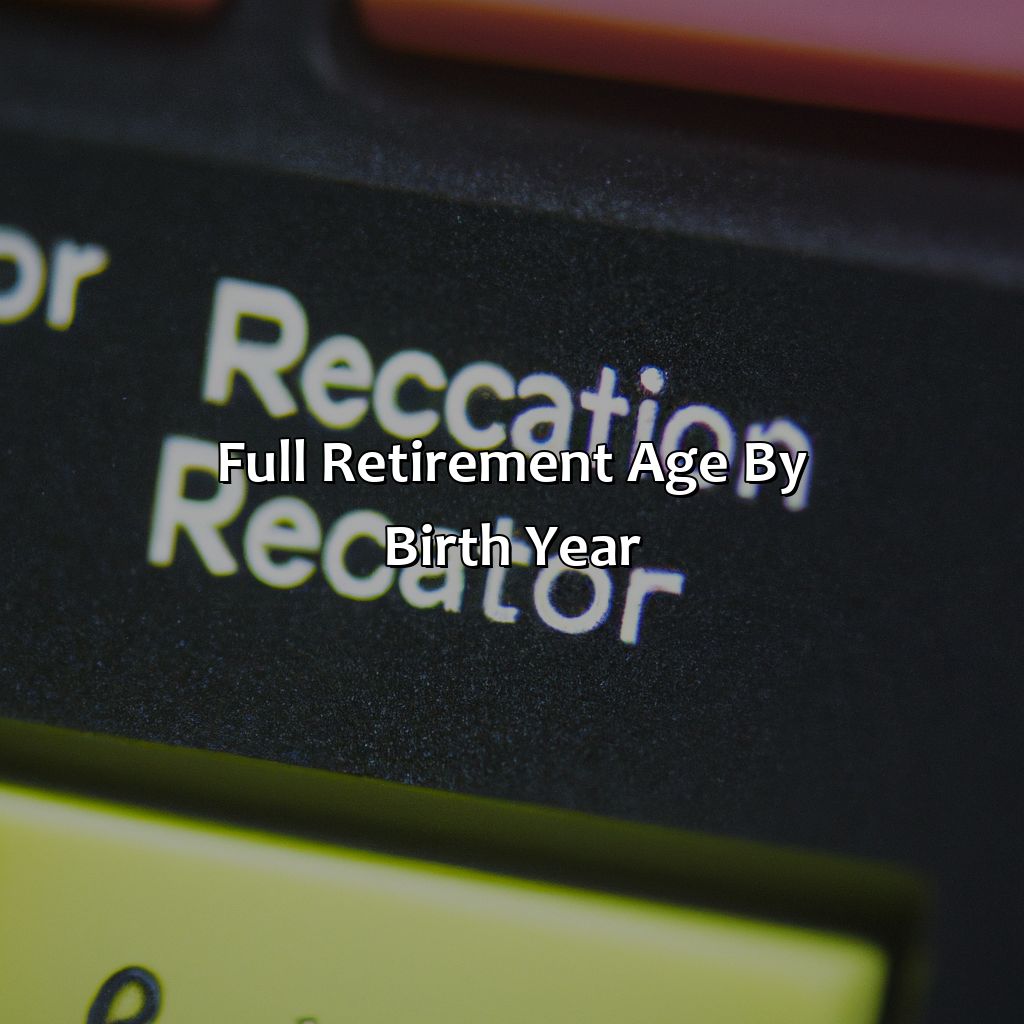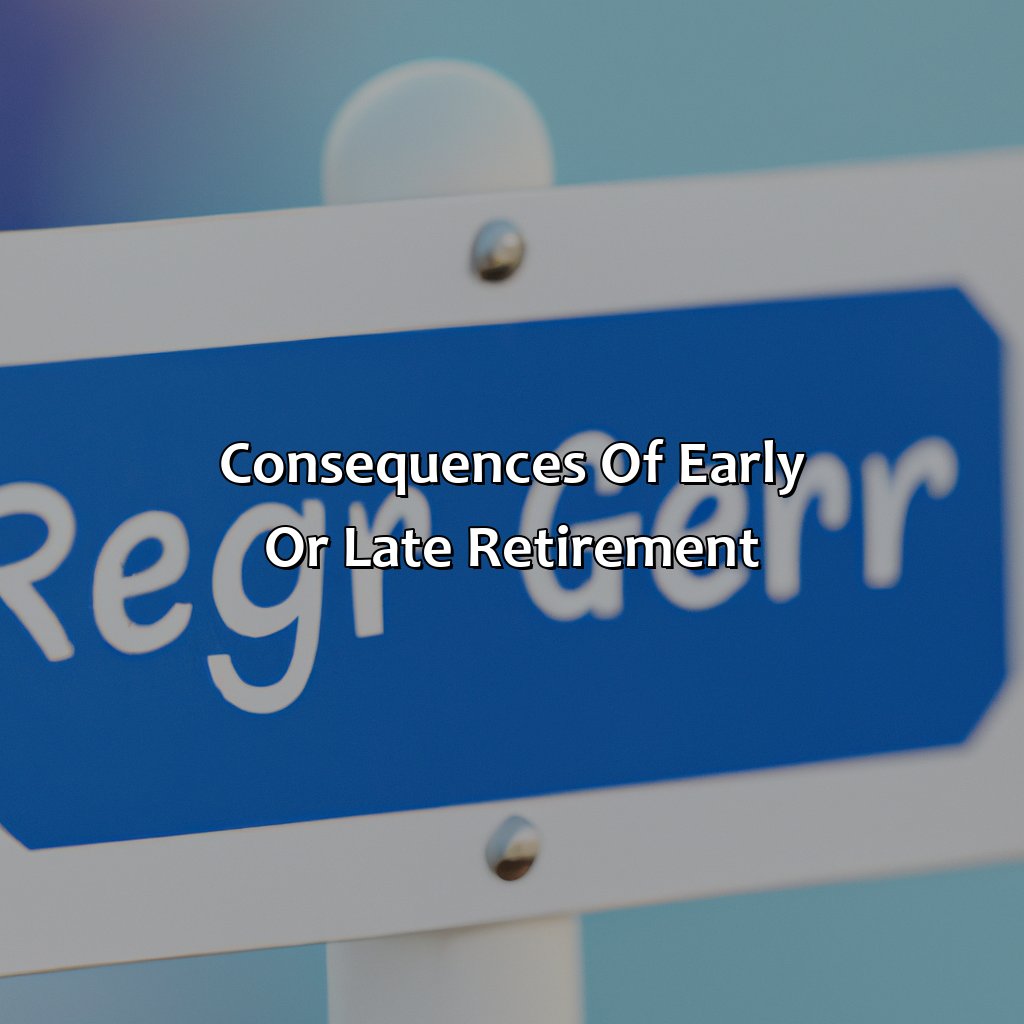What Is A Full Retirement Age?
Key Takeaway:
- The full retirement age (FRA) is the age at which an individual can receive full Social Security benefits, and it varies based on year of birth. It is important to know your FRA to plan for retirement and maximize your benefits.
- Delaying retirement until your FRA can result in higher Social Security benefits and eligibility for Medicare. However, retiring early can decrease your benefits and impact your retirement savings.
- To plan for full retirement age, estimate your retirement expenses and maximize contributions to retirement savings accounts. This can help ensure a comfortable retirement and reduce the risk of running out of money in retirement.
Are you trying to figure out when you can qualify for full retirement benefits? Learn more about Full Retirement Age, and how it affects your Social Security benefits. You can understand your retirement options and plan accordingly.
What is a Full Retirement Age?
Discovering what Full Retirement Age is and its importance requires understanding two aspects. First, get to know what comprises this age. Second, grasp the relevance of recognizing your Full Retirement Age.

Image credits: retiregenz.com by Harry Washington
Definition of Full Retirement Age
The Full Retirement Age (FRA) refers to the age at which individuals can receive their full Social Security benefits, without penalty or reduction. This age is determined based on an individual’s birth year and may differ from the standard retirement age of 65. Delaying claiming benefits until after FRA may result in increased monthly payments.
Individuals born between 1943 and 1954 have a FRA of 66 years old. Those born after 1960 have a FRA of 67 years old. The FRA gradually increases for those born between these two ranges. It is essential to note that early retirement at any point before FRA may result in permanently reduced monthly payments.
It is crucial to consider your financial plans and retirement goals when deciding on when to claim Social Security benefits. Research shows that delaying claiming benefits until after FRA can increase lifetime income over time, especially for couples.
According to the Social Security Administration, approximately 48 million Americans receive Social Security benefits as of December 2020.
Knowing your full retirement age is important, unless you enjoy being the oldest person in the office.
Importance of Knowing Full Retirement Age
Retirement planning involves determining how much income you will need post-retirement. Knowing your full retirement age is crucial in this decision-making process. If you plan to receive SociaI Security, your benefits will depend on this age. Full Retirement Age is determined by the year you were born and ranges between 66 to 67 years old. By knowing your full retirement age, you can make more informed decisions regarding when to retire and when to start receiving Social Security benefits.
Understanding the implications of retiring early or late is vital when planning for retirement. Retiring before reaching full retirement age could lead to a reduction in Social Security benefits, while retiring after the full retirement age may provide an increase in benefits. Additionally, delaying retirement increases your potential earning capacity, potentially allowing for higher savings or investments towards retirement.
It is also important to consider other sources of income that may affect the decision of when to retire or start receiving Social Security benefits such as pensions, IRA’s, and annuities. Planning ahead with these factors in mind can provide a clearer picture of what you will need financially throughout your retirement years.
To make informed decisions about your future financial stability, it is essential to be aware of all factors that may influence it. Knowing what your full retirement age is and how it affects your Social Security benefits can help you make more prudent decisions at every stage of life. To ensure a comfortable retirements, seeking professional advice from a financial advisor is recommended- they can assist you with specific goals and create customized plans that are well-suited for your needs.
Just when you thought getting older couldn’t get any worse, now you have to figure out your Full Retirement Age by Birth Year. Yay!
Full Retirement Age by Birth Year
Birth year is key in finding your full retirement age. This part, called “Full Retirement Age by Birth Year,” will tell you your full retirement age based on the year you were born. We’ll also go over changes in full retirement age during the years. So, you’ll get a better idea of retirement age policies past and present.

Image credits: retiregenz.com by Yuval Duncun
Determining Full Retirement Age Based on Year of Birth
The Full Retirement Age by Birth Year determines when one can claim full Social Security benefits. Here is a comprehensive table that shows the Full Retirement Age for each birth year:
| Year of Birth | Full Retirement Age |
|---|---|
| 1943-1954 | 66 |
| 1955 | 66 and 2 months |
| 1956 | 66 and 4 months |
| 1957 | 66 and 6 months |
| 1958 | 66 and 8 months |
| 1959 | 66 and 10 months |
| 1960 or later | 67 |
It’s noteworthy that claiming Social Security prior to full retirement age reduces monthly payments while delaying payment increases them. Understanding the Full Retirement Age by Birth Year helps in making informed decisions about claiming Social Security benefits.
According to the Social Security Administration, nearly nine out of ten individuals aged sixty-five or older received Social Security Benefits in the United States. Full retirement age may have changed over the years, but sadly, our fondness for office potlucks and uncomfortable small talk at family gatherings has not.
Changes in Full Retirement Age Over the Years
The Full Retirement Age has been modified over time. There have been several alterations in the recent few years.
The following table displays the changes made in the Full Retirement Age over the years:
| Birth Year | Full Retirement Age |
|---|---|
| 1937-1942 | 65 |
| 1943-1954 | 66 |
| 1955-1959 | Between ages of 66 and two months -67 |
| 1960 or later | 67 |
It is clear from the table that there has been an increase in the Full Retirement Age for those born between the years of 1937 and later.
Moreover, these changes were introduced to cope with life expectancy growth and reduce financial pressure on Social Security.
Pro Tip: It’s always a good idea to keep track of your Social Security benefits by creating an account on My Social Security website.
Delay retirement and you might just have enough time to learn the lyrics to the entire Hamilton soundtrack.
Benefits of Waiting Until Full Retirement Age
Maximizing post-retirement benefits is best done by waiting till your full retirement age. In this section, we will explore how delaying payments can increase Social Security benefits and make you eligible for Medicare.

Image credits: retiregenz.com by Adam Woodhock
Higher Social Security Benefits
Receiving maximum Social Security benefits is possible if you wait until your full retirement age. This ensures that you receive the highest amount of funds for as long as you live. By delaying your retirement claim, you can increase your benefit amount by approximately 8% per year, which can add up to a substantial sum over time.
Once you turn Full Retirement Age (FRA), regardless of whether you continue to work or not, your earnings won’t affect the social security benefit payments. Moreover, continuing work after FRA while claiming Social Security benefits allows even more significant increases in your monthly payout.
On top of higher benefits, waiting until FRA can also significantly impact many other aspects like taxes and healthcare budgets and help ensure a more financially secure retirement. Therefore, proper planning around when one should retire is a crucial consideration for anyone who wants to receive maximum Social Security benefits.
Pro Tip: Plan early with a trusted financial expert to determine an optimal Retirement age that works best for you so that you can enjoy maximum social security payouts without compromising other areas of personal finance.
If you’re counting down the days until Medicare eligibility, just remember – it’s not just for the elderly, it’s for the young at heart with bad knees and prescription drug addictions.
Medicare Eligibility
Reaching the Period of Medicare Entitlement
The period at which one becomes eligible for Medicare, the federal health insurance program in the United States, is a matter of age and other criteria. Those who have worked for at least ten years while paying social security taxes can receive premium-free Part A coverage as soon as they turn 65. However, eligibility for other parts may vary based on factors like income, disabilities, and medical conditions.
As one approaches the age of 65 – or when they anticipate needing health services beyond what their current plan covers – it’s crucial to learn about Medicare options and enroll in time. One must not only know which parts they’re eligible for but also compare costs and benefits between Original Medicare and alternatives like Advantage Plans or Supplemental Policies.
Remember that even though there are late-enrollment penalties that could last your entire lifetime if you miss your initial six-month sign-up window, there are exceptions available too. For example, those still working past age 65 may qualify for a Special Enrollment Period.
A friend who had delayed signing up for Part B because he didn’t think he’d need it until he retired ended up getting diagnosed with a chronic condition that required frequent treatments just before his retirement date. He was then penalized over $2k/year extra indefinitely since he wasn’t entitled to a special enrollment period after his initial decision deadline passed.
Retire too early and you’ll be counting pennies, retire too late and you’ll be counting wrinkles.
Consequences of Early or Late Retirement
It’s important to consider the effects of retiring either early or late on your Social Security benefits and retirement savings. Therefore, this section will explore the pros and cons of choosing to retire earlier or later than the standard full retirement age. It’s focused on “Consequences of Early or Late Retirement”.
Sub-sections are:
- Reductions in Social Security Benefits
- Impact on Retirement Savings

Image credits: retiregenz.com by Adam Duncun
Reductions in Social Security Benefits
The amount of social security benefits that retirees receive is influenced by a variety of factors, including when they retire. Late retirement generally increases the monthly payments received from Social Security, while early retirement reduces the amount of the monthly benefit payments.
Retirees who start receiving benefits before reaching full retirement age – a variable age between 65 and 67 years old, depending on the year of birth – will see their benefits reduced. The reduction can be as much as 30% less than what they would have received if they had waited until full retirement age to begin receiving social security benefits.
It’s important to also note that waiting until after full retirement age to retire can increase monthly benefit payments by up to 8% per year until the age of 70. This means delaying retirement for a few years can significantly increase social security payouts.
One suggestion is to calculate expected monthly payouts at different retirement ages and determine which option would provide the best financial outcome based on personal circumstances. Additionally, creating a comprehensive financial plan that includes savings and investments outside of social security can also help ensure financial stability in retirement.
Retirement savings? Ain’t nobody got time (or money) for that!
Impact on Retirement Savings
Retirement Savings: Timely or Delayed Decision
Making the right decision between early or late retirement is crucial to preserve your retirement savings. Affecting not only the pension amount but also various factors such as longevity, healthcare, inflation and market fluctuations.
Delaying full retirement age enhances social security benefits by 8% per year while retiring early could lead to a fixed reduced payment for life. Indulge in meticulous planning and on-time research with every aspect of your finances playing a key role.
Consider cost-cutting options before panicking, weighing in more income-earning years instead of spending those accumulating debts fearlessly. It’s vital to check up on 401(k) and other investments providers for their post-retirement plans.
As we do not want our twilight years taken away from experiencing travel destinations or luxurious recuperation, save generously!
Don’t wait till retirement to start planning, or you’ll end up spending your golden years in the McDonald’s drive-thru line.
Planning for Full Retirement Age
Maximize retirement benefits by planning for your full retirement age. Estimate your retirement expenses and maximize retirement savings contributions. Calculate expenses and identify ways to save money. This helps secure funds for a comfortable retirement. Maximizing retirement savings contributions builds a retirement nest egg for your golden years.

Image credits: retiregenz.com by David Duncun
Estimating Retirement Expenses
Retirement Financial Plan
Retirement financial plan is a crucial aspect of one’s future. This involves estimating all the expenses that may arise during the retirement period, which can be complicated to predict. An estimation of the cost of living, medical expenses, entertainment expenses, and various other miscellaneous expenses may be involved in determining a retirement budget.
It is important to consider inflation and taxes when calculating these costs. A well thought out plan will include potential sources of income such as social security benefits, 401K plans and pensions. However, it is essential to keep in mind that a good plan must prepare for unexpected changes in finances.
Adequate planning for retirement can help ensure a comfortable lifestyle after retiring. Many people do not begin to save towards their retirement accounts until much later in life and are unprepared for their golden years. Careful planning well ahead can prevent this from happening.
The Importance of Planning for Retirement Financial Stability
Planning well can prevent an individual from running into financial trouble after they have retired. Inadequate strategies usually force individuals who did not draft proper retirement plans back into the workforce or lead them into selling off assets to cover expenses further diminishing their future investment. Therefore, it’s crucial to determine what your interests are before making any significant decisions that could affect your future financial stability in any way that may impact your quality of life.
To summarize: a successful financial savings strategy increases funds set aside for retirement while minimizing debt obligations during working years – though maintaining personal life balance requires compromises on both ends.
Save now or work forever, the choice is yours – Maximizing Retirement Savings Contributions.
Maximizing Retirement Savings Contributions
When it comes to maximizing your retirement savings contributions, there are several tactics you can utilize to ensure that you are financially prepared for retirement.
- Consider maxing out your 401(k) or IRA contributions. This can help increase your savings and grow your nest egg over time.
- Take advantage of any employer matching contributions by contributing the maximum amount allowed. This is essentially free money for your retirement fund.
- Consider diversifying your investments and choosing low-cost index funds or target-date funds to minimize fees and maximize returns.
It’s important to note that while maximizing retirement savings is crucial, it should also be balanced with other financial goals such as paying off debt and building an emergency fund. Make sure to consult with a financial advisor to develop a personalized plan that aligns with your long-term goals.
Did you know that according to a survey by Bankrate, 20% of Americans aren’t saving anything at all for retirement?
Some Facts About Full Retirement Age:
Full retirement age is the age at which a retiree can receive their full Social Security retirement benefits. (Source: SSA)
The full retirement age varies depending on the year you were born. (Source: AARP)
For those born between 1943 and 1954, the full retirement age is 66. (Source: SSA)
It’s possible to start receiving Social Security retirement benefits as early as age 62, but the benefits will be reduced. (Source: SSA)
Delaying retirement past full retirement age can result in increased Social Security benefits. (Source: Forbes)
FAQs about What Is A Full Retirement Age?
What is a Full Retirement Age?
A Full Retirement Age (FRA) is the age when a person becomes eligible to receive full Social Security benefits. This age varies based on one’s birth year.
When was the Full Retirement Age set?
The Full Retirement Age was set by the Social Security Amendments of 1983.
What is the current Full Retirement Age?
The current Full Retirement Age is 66 for people born between 1943 and 1954. For those born in 1960 or later, the Full Retirement Age is 67.
Can I retire before my Full Retirement Age?
Yes, you can retire before your Full Retirement Age. However, if you retire before your FRA, your Social Security benefits may be reduced.
Can I retire after my Full Retirement Age?
Yes, you can. If you delay taking your Social Security benefits until after your Full Retirement Age, your monthly benefit amount will increase.
 Checkout this IRS Loophole
Checkout this IRS Loophole 



